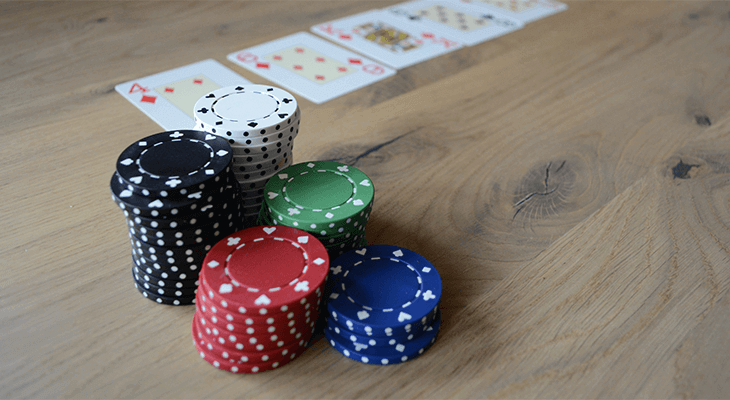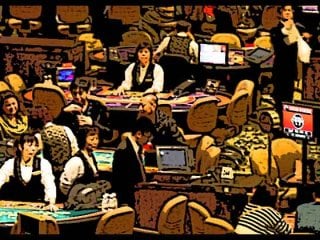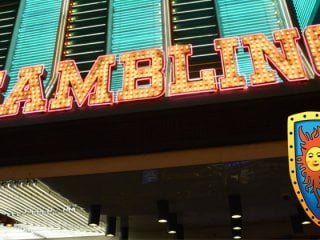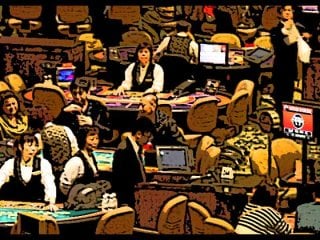How Does a Casino Make Money on Poker?
By Alex Smith, Last updated Mar 23, 2024

It will come as no surprise to learn that online poker sites and online casinos are in the business of making money; that’s their ultimate goal, and while many of these sites may offer attractive – and lucrative – bonuses and promotions designed to temp in new players, the ultimate goal is to generate as much revenue as possible.
All casino games are designed to turn a profit for the casino, and poker is no exception. Poker is unique; unlike other casino table games, you’re not playing directly against the casinos. This raises the question of how online poker sites and casinos can generate cash from their games.
On this page, we will look at how online poker rooms generate revenue – and how they can keep this revenue steady for long periods. As a general rule of thumb, there are three main ways an online poker room can generate revenue – and we’ll be looking at these methods in this article.
How a Poker Room Makes Money: Pot Rake
As a general rule of thumb, online poker rooms make money through what is known as the rake. The casino will charge this rake to generate profit whether you are playing a cash game or a tournament. Naturally, the amount of rake charged – and the method in which the casino charges it – varies greatly depending on the poker room you are playing in and the type of poker game you are playing.

$35
No Maximum
40x
No code required
–
–
Yes

$10; $20 if depositing via BTC
N/A
20x (deposit+bonus)
–
–
$110
Yes
There are a few main types of methods casinos can use the charge rake, and below, we’ll be taking a look at these in detail. Please note these are guidelines only, and you should always check with the casino or poker site you are considering playing at to find out their rules surrounding rake.
Understanding How Poker Rooms Calculate Rake
Cash Games
Whenever you play cash games at poker websites or land-based poker rooms, the dealer will almost always take a portion of the pot at the end of the hand. Once the round is finished and the winner of the hand has been announced, the dealer will deduct a small amount of money before the pot is pushed over to the winner. The rake is not usually charged in the event of a tie or a split hand.
At most online poker websites, and in the vast majority of land-based poker rooms, the amount of rake deducted from the pot is calculated using a fixed percentage. This percentage varies greatly depending on where you are playing and the type of game you enjoy, but it is usually between 2.5% and 10%. As an average, you should usually expect casinos to take a 3.5% rake out of every cash game pot.
Now, 3.5% may sound like quite a lot of money – and, to be fair, it is. When you consider that online poker rooms and land-based casinos typically run poker games 24 hours a day, seven days a week, you can quickly see how much money they can make by taking a rake. However, the rake is almost always capped at a maximum amount per hand. For example, low-stake poker tables generally have a $10 rake cap. Any amount over $10 is not subject to the rake deductions.
Naturally, the larger the stakes you are playing, the more rake a poker site will typically take. Not all land-based poker rooms have a fixed amount limit. As a general rule of thumb, you should avoid playing non-fixed rake versions of poker, as doing so can cost you a lot of money.
Tournaments
Poker tournaments are very different from cash games. Poker tournaments require players to battle one another for chips and try to outlast their opponents. In most poker tournaments, the players who reach the final table – and finish last – walk away with the biggest prizes. Poker tournaments do not use real cash, casinos and online poker websites cannot charge rake.
Instead, you pay an entry fee to the poker tournament – also known as the buy-in. For example, if you enter a $300 poker event, you may pay a $30 surcharge to the casino. This $30 is not added to the total prize pool and is kept by the casino to pay their dealers and cover their costs.
One of the reasons why online poker tournaments have become so popular is because the entry fees are generally a lot lower than the ones found in land-based poker rooms. The reason behind this should be relatively straightforward; online poker websites have much lower overheads than their land-based counterparts, and these savings are usually passed on directly to players.
Think about it; when you play poker in a live environment, the casino needs to pay for the dealers, floor space is being taken up, and everything needs to be planned – and this all comes at a cost. When you are playing online poker, there are relatively few costs aside from the technical staff employed and the costs associated with running the servers.
Hourly Rate
While most low-stakes cash games will utilize a rake-based format, casinos realize that players playing at larger stakes will not be happy with this. For example, if poker pots are frequently worth thousands of dollars – or even more – this can quickly add up to a considerable amount of money that the casino would need to deduct from the pots every hand.
As a result, some casinos and poker rooms will also offer you the chance to pay an hourly rate. This means all the players at the table pay a set amount every hour; in return, the dealer does not take any rake from the pots. When an hourly pay structure is utilized, the money involved in the poker pots is paid directly to players.
This approach is usually taken by high-stakes players, although some poker rooms and land-based casinos offer the option of lower-stake cash games too. Usually, the hourly fee is chargeable once per hour, and players can pay it directly to the dealer using chips from the chips on the table or cash – whichever is most accessible.
How Else Do Poker Rooms Make Money?
Aside from the methods we have just discussed, there are several other ways that poker rooms and online casinos can make money from poker. For example, traditional brick-and-mortar casinos will attempt to supplement their revenue by charging high prices for food and beverages. While some land-based poker rooms will offer players free drinks, this is generally reserved for those playing in cash games – usually at relatively big stakes.
For example, land-based poker rooms may offer all players free water and soft drinks – but when it comes to alcoholic drinks or food, the prices may be marked up by as much as 100%. This is quite a clever technique, as most players at the poker table will not want to get up and go elsewhere to get cheaper food. They will usually be happy to pay higher prices for the convenience factor. The food is delivered directly to the poker table, and most brick-and-mortar poker rooms allow players to eat at the table – provided no other players object.
When it comes to online poker rooms, they need to get a bit more creative in generating additional revenue. One of the most common methods is to try and convince players to play casino games like video slots.
For example, when you play at many online poker sites, you will often be able to bring up a slot machine – and play – while playing in a poker game. This can be an incredibly lucrative source of revenue for the online poker website, and it’s one of the reasons why most poker sites also have an online casino.
Many online poker websites will also run special live events. For example, PartyPoker runs several live tournaments throughout the year – and these tournaments, while offering sizable prize pools, cost players significantly more money to enter than the online games they offer.
Another technique we have seen used by online poker rooms to generate revenue is licensing out their software and technology to other casinos. For example, online poker software is often licensed under a white-labeled agreement in the US market. Developing and maintaining online poker software can be insanely expensive – and small operators often do not have enough money to develop their proprietary software from scratch.
As a result of this, more minor, newer sites will often license out the poker software from larger, more established operators – at a fee, of course.
Poker sites and brick-and-mortar poker rooms are always getting creative with revenue-generating techniques. The ones we have just talked about are, in no way, exhaustive – and you will always find poker sites coming up with new ways to generate revenue.
FAQs
What Is Rake?
Whenever you play poker, whether it is a live cash game or an online cash game, you will be charged what is known as the rake. This is a small percentage that the casino takes out of every pot played. It’s the primary way online poker websites and brick-and-mortar poker rooms make money. At the end of the hand, before the chips are pushed to the winner, the dealer will deduct a small amount of money from the pot – usually around 3%.
This percentage is usually capped – so, for example, the dealer may take 3% out of every pot up to a maximum of $10. Any pots larger than this will only be raked at a maximum of 3% up to $10.
Do Tournaments Have Rake?
No, because tournaments are not using real money – they use tournament chips instead – casinos cannot take a rake out of every pot like they do in a cash game. Instead, they will charge players what is known as an entry fee.
This entry fee is payable when you first sign up for the tournament. For example, if a poker tournament costs $100, the casino usually adds a $10 entry fee. This entry fee is designed to cover all of the costs associated with the tournament, and the money taken is not added to the total prize pool; instead, it is kept by the casino and used to pay their staff and other expenses.
What Is an Hourly Fee?
High-stakes poker players generally do not want a rake to be taken from their pots. This is because the value of the pots they are playing with is often incredibly high – we can be talking tens of thousands of dollars here. If a casino or online poker site was to take a rake, the players could lose hundreds of thousands of dollars over a night – which is why some casinos and online poker websites give players a chance to pay an hourly fee instead.
As the name suggests, this hourly fee is a charge payable by the players every hour. For example, each player may be required to pay $20 every hour, which is paid directly to the dealer. Players can use the chips on the table to pay or cash – it’s entirely up to them.
The casino will not rake the pots in return for paying this hourly fee. Players need to pay this fee once per hour.
What Is a Dead Drop?
Some brick-and-mortar cardrooms offer players the chance to play in games with a dead drop fee. This is a unique type of rake in poker games, and every player pays the same amount – regardless of the pot size or how much money they have in front of them.
In conventional poker, the winning player ends up paying the rake. The dealer deducts the money automatically from the pot before the winnings are passed to the player. However, players participating in a dead drop game pay rake when they are on the button. This is usually an agreed fixed rate.
The main benefit of a dead drop structure is that every player at the table pays the same amount of money – regardless of whether they win or lose. Of course, this does come at a disadvantage to losing players, as it means they spend more money than they would have had they been playing a conventional rake game.
Can You Play Poker with No Rake?
Today, many of the world’s largest online poker rooms offer special tournaments that have no rake. For example, free-roll tournaments are free to enter, and there is no charge to enter; despite it being free, real money can be won by the players at the table. As you’d guess, these tournaments do not require you to pay any rake as they are free to enter.
Occasionally, poker sites will also run special rake-free tournaments. This is quite a useful promotional tool to attract new players, and it is something we are starting to see more frequently in online poker rooms – particularly those who are new and are attempting to attract new players.
Unfortunately, rake-free cash games are usually hard to find in online card rooms. However, if you play in conventional brick-and-mortar card rooms, you may find low-rake or no-rake sessions – especially if the tables are short-handed and the casino is looking to get more players to sit at the table.
What Are Online Rake Bonuses?
The unfortunate reality is that poker sites exist by taking a rake from players. However, you may be surprised to learn that earning some of the rake back is possible by claiming a special poker site bonus. For example, most of the world’s largest online poker websites tend to offer some rakeback promotion. This allows you to join a unique program – sometimes a VIP or loyalty program – and earn a portion of your paid rake back in real cash.

$35
No Maximum
40x
No code required
–
–
Yes

$10; $20 if depositing via BTC
N/A
20x (deposit+bonus)
–
–
$110
Yes
While each online poker website does this differently, you can often do this by earning points by playing tournaments and cash games. For example, you might earn 10 points for every $10 in rake you pay at the table. However, you usually need to be a reasonably active player – contributing to pots – to qualify for this type of promotion.
Once you hit the required minimum number of points, you can begin earning a rakeback percentage. This rakeback is usually paid straight into your online poker account – generally speaking, it is wager-free, meaning you can withdraw it or spend it on other poker games without needing to complete any wagering requirements.
You would be surprised at how quickly rakeback promotions like this can add up – and most of the higher-staking poker players who play online will choose a poker site almost solely depending on the rakeback promotions available. Please note that tournament fees are usually excluded; other casino games are unlikely to contribute to the poker rake-back promotions.
Poker Related Articles you should read
How Many Hands Per Hour: Live Poker Explained
In this blog post, we’ll dive into the factors influencing the number of hands dealt per hour in live poker.
How to Play Slow Roll Poker
The goal of poker is to beat your opponent; in fact, doing so is actively encouraged! However, while you should always try your best to throw your opponents off-balance and coerce them to make mistakes
What is the Dead Man’s Hand in Poker?
The deadman’s hand is one of the most iconic hands in poker. While some players have slightly different definitions of the dead man’s hand, most people regard it as a hand containing two Aces and two Eights – equalling two pairs. However, while the hand may look quite simple, there is much more to meet the eye.
What Happened to Mike Matusow
If you’re wondering what’s actually happened to Mike Matusow – and want to know what this colorful character is up to these days – keep reading to find out what this star poker player is up to these days!
How to Play Red Dog
Red Dog, also known as Red Dog Poker, is quite a popular game. Today, you will find it offered at most online casinos. Some land-based casinos also offer it, although it’s not found as commonly.




 Top 5 casinos
Top 5 casinos 

